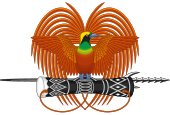1977 Papua New Guinean general election
 |
|---|
|
General elections were held in Papua New Guinea between 18 June and 9 July 1977,[1] the first since independence from Australia in 1975. The Pangu Party led by Prime Minister Michael Somare emerged as the largest in the National Parliament. Somare subsequently formed a coalition government with the People's Progress Party (PPP) and several independent MPs. Voter turnout was 60.3%.
Background[]
The usual four-year term of the House of Assembly was extended to five years shortly before independence, pushing back elections to the renamed National Parliament from 1976 to mid-1977. However, in June 1976 Prime Minister Michael Somare proposed holding early elections in November 1976. Although the proposal was approved by a vote of 45 to 40 in parliament, at least half of the 104 MPs were required to vote in favour for the motion to pass.[2] Prior to the elections, the electoral system was changed from single transferable vote to first-past-the-post.[3]
Campaign[]
Just under 900 candidates contested the elections, with between two and 21 candidates in each constituency. Ten candidates were women.[4] Polling in the Abau Open constituency was postponed due to the death of a candidate.[3]
Results[]
Three women – Nahau Rooney, Waliyato Clowes and Josephine Abaijah – were elected, a number not repeated until 2012.[4] Nine ministers lost their seats, a number that increased to ten when was defeated in the delayed contest in Abau.[5]
Following the elections, most of the independents joined parties at the first sitting of parliament, with Pangu gaining a further ten seats, the PPP four and Papua Besena and the United Party one, leaving eleven members sitting as independents.[6]
| Party | Votes | % | Seats | |
|---|---|---|---|---|
| Pangu Party | 35.0 | 30 | ||
| People's Progress Party | 15.0 | 16 | ||
| United Party | 10.0 | 23 | ||
| Papua Besena | 5.0 | 5 | ||
| 3.0 | 2 | |||
| National Party | 2.0 | 2 | ||
| 3 | ||||
| Independents | 30.0 | 27 | ||
| Vacant | – | – | 1 | |
| Invalid/blank votes | – | – | ||
| Total | 970,172 | 100 | 109 | |
| Registered voters/turnout | 1,607,635 | 60.3 | – | |
| Source: Nohlen et al., Pacific Islands Monthly | ||||
Aftermath[]
Following the elections, Michael Somare was elected Prime Minister, defeating John Guise (who was supported by the United Party) by 69 votes to 36. Somare established a coalition government of the Pangu Party, the People's Progress Party and some independent members, forming an 18-member cabinet. Kingsford Dibela was elected Speaker and of the United Party became Leader of the Opposition.[7]
| Position | Member | Party |
|---|---|---|
| Prime Minister | Michael Somare | Pangu Party |
| Deputy Prime Minister | Julius Chan | People's Progress Party |
| Minister of Commerce | Pangu Party | |
| Minister of Decentralisation | John Momis | Independent |
| Minister of Defence | People's Progress Party | |
| Minister of Education, Science and Culture | Independent | |
| Minister of Environment, Conservation and Human Settlement | Pangu Party | |
| Minister of Finance | Barry Holloway | Pangu Party |
| Minister of Foreign Relations and Trade | Pangu Party | |
| Minister of Health | People's Progress Party | |
| Minister of Justice and Liquor Licensing | Pangu Party | |
| Minister of Labour and Industry | People's Progress Party | |
| Minister of Media | Pangu Party | |
| Minister of Natural Resources | Pangu Party | |
| Minister of Police and Corrective Institutions | Pangu Party | |
| Minister of Public Utilities | People's Progress Party | |
| Minister of Transport, Works and Supply | People's Progress Party | |
| Minister of Youth | Independent |
Later in 1977, Somare appointed four additional ministers; (PPP) as Minister for Works and Supply, (Independent) as Minister for Housing, as Minister for Minerals and Energy and Nahau Rooney (Independent) as Minister for Corrective Institutions and Liquor Licensing.[5] Rooney became the first woman to hold a cabinet portfolio in Papua New Guinea.
See also[]
References[]
- ^ Dieter Nohlen, Florian Grotz & Christof Hartmann (2001) Elections in Asia: A data handbook, Volume II, p770 ISBN 0-19-924959-8
- ^ No jumping PNG election gun Pacific Islands Monthly, August 1976, p18
- ^ Jump up to: a b PNG's elections: A cliffhanger and a lesson for the future Pacific Islands Monthly, September 1977, pp16–17
- ^ Jump up to: a b Sepoe, Orovu, "To make a difference: Realities of women’s participation in Papua New Guinea politics", Development Bulletin, no. 59, 2002, p.40. (Electronic version Archived 2009-09-13 at the Wayback Machine)
- ^ Jump up to: a b Somare's team grows Pacific Islands Monthly, October 1977, p20
- ^ Nohlen et al., p774
- ^ Somare leads a new look team Pacific Islands Monthly, September 1977, p9
Related links[]
- Elections in Papua New Guinea
- 1977 elections in Oceania
- 1977 in Papua New Guinea
- National Parliament of Papua New Guinea